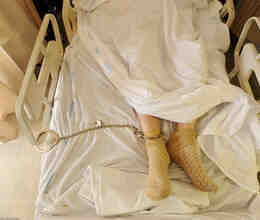
Solitary Confinement: Torture in Your Backyard
By Rev. Richard Killmer
Seeing and hearing prisoners who have experienced prolonged solitary confinement is not easy. The emotional and physical damage done to prisoners held in solitary does not present a pretty picture.
It is not easy for anyone to learn the truth about solitary confinement, but for people of faith at least two important tenets of faith make solitary unacceptable. As religious people, we believe that everyone has been given by their creator dignity and worth. Solitary confinement degrades those gifts. In addition, faith teaches us that human beings thrive in community. That does not mean that people will not occasionally choose time alone to enhance their faith journey, but denying human beings the community they need is unacceptable.
Because we therefore believe solitary confinement is morally wrong, the National Religious Campaign Against Torture (NRCAT) has produced a film called Solitary Confinement: Torture in Your Backyard. The film makes the case that solitary is damaging.
The film features interviews with ex-prisoners from the supermax prison in Maine as well as the families of prisoners currently in solitary confinement in Maine and Virginia, who describe the effects of prolonged solitary confinement.
The film also includes an interview with Sarah Shourd, one of the three American hikers captured near the Iranian border, who was held for 14 months in solitary confinement. Sarah describes the changes in her perceptions and thought-patterns as well as in her emotions. She recalls one time she was screaming and when the guards came into her cell to calm her, she then realized that she had been screaming. Another time, she was pounding on the walls, but didn’t know she was doing so. She finally figured it out because her knuckles and the wall were bloody.
The film also tells the story of the role of the religious community in Maine in reducing the number of prisoners in solitary confinement. The work of NRCAT, the Maine Council of Churches, the Maine Civil Liberties Union and other advocates led to the Maine Legislature passing a resolve that required the Department of Corrections to review its use of isolation and report its findings. Accordingly, the Maine Department of Corrections prepared a report that included many recommendations to improve due process and other policies related to the placement of prisoners in solitary confinement and reported it to the legislature. Prompted by those recommendations, the Maine Department of Corrections cut the number of prisoners held in solitary confinement by over 70 percent in 2011.
Solitary Confinement: Torture in Your Backyard urges people of faith to develop similar legislative efforts in their states. As people of faith, we are called to speak for those in our community who have no voice – the poor, orphaned, and imprisoned.
I hope you will watch Solitary Confinement: Torture in Your Backyard and work to end prolonged solitary confinement in this country. Learn more about what you can do and watch the film here.
Learn more about solitary confinement: Sign up for breaking news alerts, follow us on Twitter, and like us on Facebook.


Arizona Violated the Rights of Incarcerated People for More Than a Decade....
January 23, 2023
50 Years of Fighting for the Rights of Incarcerated People
September 26, 2022
Despite Backlash, Voters and Lawmakers Continue to Choose Criminal Justice...
September 12, 2022
